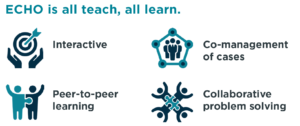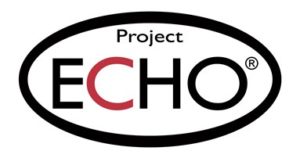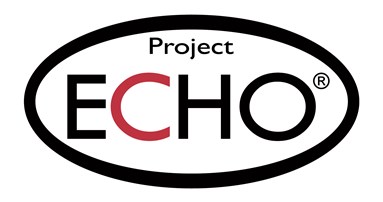Project ECHO
Extension for Community Healthcare Outcomes

A Revolution in Medical Education and Care Delivery
Project ECHO (Extension for Community Healthcare Outcomes) is a collaborative model of medical education designed to create virtual communities of learners by bringing together healthcare providers and subject matter experts using videoconference technology, brief lecture presentations, and case-based learning, fostering an “all learn, all teach” approach. Participants are engaged in the bi-directional virtual knowledge network by sharing clinical challenges and learning from experts and peers.
To learn more about the Project ECHO model, visit hsc.unm.edu/echo.
Ethics in Dementia Care ECHO
Thursdays from 12 to 1 pm, April 11 through May 30, 2024
Presented by HSC’s community partner James L. West Center for Dementia Care, the eight-week ECHO session covers issues pertaining to ethics in dementia care, including:
- Approaching and responding to Ethical Dilemnas
- Ensuring safety and autonomy for older adults living alone
- Ethical principles for quality of life at end-of-life
- Fair and equitable treatment options for persons with dementia
Visit James L. West for more information or to register
Have questions or want more information? Contact Jaime at 817-877-1199 or caregiver@jameslwest.com.
Geriatrics ECHO for Resident Education
First Thursday of the month, from 1 to 2 pm, from August 10, 2023 to May 2, 2024
In 2023 and 2024, faculty in the Center for Older Adults will lead monthly sessions for residents at area hospitals, using the ECHO model. For one hour a month, residents will log into a Zoom meeting covering a topic in geriatrics followed by a group discussion of a case presented by one of the residents. Sessions incorporate the Institute for Healthcare Improvement (IHI) Age-Friendly Health Systems 4Ms Framework. Any resident is welcome to attend free of charge.
August 10 – Cognitive and behavioral disorders (Mind)
September 7 – Atypical presentations of disease (Multicomplexity)
October 5 – Hospital care (Multicomplexity)
November 2 – Home-based care of older adults (Multicomplexity)
December 7 – Self-care capacity (Mind)
January 4 – Balance and fall risk in older adults (Mobility)
February 1 – Medication management (Medications)
March 7 – Health care planning (Matters Most)
April 4 – Palliative and hospice care (Matters Most)
May 2 – My life, my story (Matters Most)
Please register to get the Zoom link for the meetings.
For more information, please contact:
Susanna Luk-Jones, MS
Susanna.Luk-Jones@unthsc.edu
Nursing Home STRONG ECHO
There are no new Nursing Home STRONG ECHO sessions scheduled at this time. You may view past sessions by visiting the Nursing Home STRONG ECHO YouTube playlist. Each recording is approximately 20 minutes long. You may also explore HSC-developed online materials for the nursing home workforce. The free online modules are available at any time and cover topics from recruitment and retention to dementia care and infection prevention.
Emergency Preparedness for Long Term Care
February 1 to September 6, 2023
Preparing for emergencies in long-term care facilities means more than having a plan in place. In spring 2023, Nursing Home STRONG takes a closer look at emergency preparedness. Beginning with evaluating your existing plan, the seven ECHO sessions consider how to prepare for different types of threats and manage staff and resident responses. Each session employs a combination of didactic presentations and case studies from actual situations, considering emergency preparedness from several angles.
February 1 – Evaluating your Emergency Preparedness Plan
Review regulatory requirements for nursing facilities related to emergency preparedness.
March 1 – Communication is Key
Discuss real world applications of the facility emergency preparedness plan.
April 5 – Supporting Mental Health During Crisis Times
Identify mental health needs and provide support during times of crisis.
June 7 – Special Considerations for Persons Living with Dementia
Discuss accommodations to emergency preparedness procedures to support persons living with dementia.
July 26 (date change) – Planning Ahead for Natural Disasters: Hunker Down or Clear ‘em Out!
Describe approaches for sheltering in place contrasted with evacuation for natural disasters.
August 2 – Facility Safeguards Against Internal and External Threats
Describe actions to take when confronted with an active shooter and responding to law enforcement officials.
September 6 – Avoiding Infectious Outbreak through Proactive Procedures
Demonstrate infection prevention and control procedures for unanticipated infectious disease outbreaks.
For more information, please contact:
Susanna Luk-Jones, MS
Susanna.Luk-Jones@unthsc.edu
Geriatrics ECHO
Geriatrics ECHO does not have any sessions scheduled currently. Those on the registration list will receive notices of any future sessions. Physicians in residency are welcome to attend Geriatrics ECHO for Resident Education. See below for information about the 2023 ECHO series.
Safety and Dementia: Reducing Risk and Severity of Common Challenges
February 15 to September 20, 2023
February 15 – Falls Risk Management at Home
Apply interventions in the home setting that reduce fall risk and promote safety in persons living with dementia.
March 15 – Dementia Care Transitions: Dead Ends, Detours. and Denials
Describe challenges related to receiving care in the acute care setting and care transitions for persons living with dementia and their caregivers.
April 19 – Considerations for the Older Adult Driver with Cognitive Impairment
Discuss areas of evaluation relevant to the older adult driver and strategies to help support persons living with dementia who can no longer drive safely.
May 17 – Managing the Dangers of Wandering
Identify approaches to the person living with dementia who wanders, including environmental and behavioral interventions to promote safety while respecting autonomy.
June 21 – Behavioral Concerns Related to Compliance with Personal Care and Hygiene
Discuss how to support independence with personal care in persons living with dementia, and methods for dealing with poor hygiene or avoidance of basic personal care tasks.
July 19 – The Mouth: The Importance of Oral Hygiene
Recognize the value of oral hygiene for overall health and changes that occur with aging.
August 16 – Proper Medication Management
List common medication safety concerns that can arise for persons living with dementia and apply principles of patient priorities to guide optimization of medication regimens.
September 20 – Safety Concerns Related to Care Coordination for the Older Adult with Cognitive Impairment
Describe challenges of managing care from multiple health care professionals as it relates to the person living with dementia, the caregivers, and the primary care provider.
For more information, please contact:Susanna Luk-Jones, MS |
This project is supported by the Health Resources and Services Administration (HRSA) of the U.S. Department of Health and Human Services (HHS) under grant number U1QHP287350100. Its contents are solely the responsibility of the authors and do not necessarily represent the official views of the Health Resources and Services Administration or the U.S. Department of Health and Human Services.


Social media